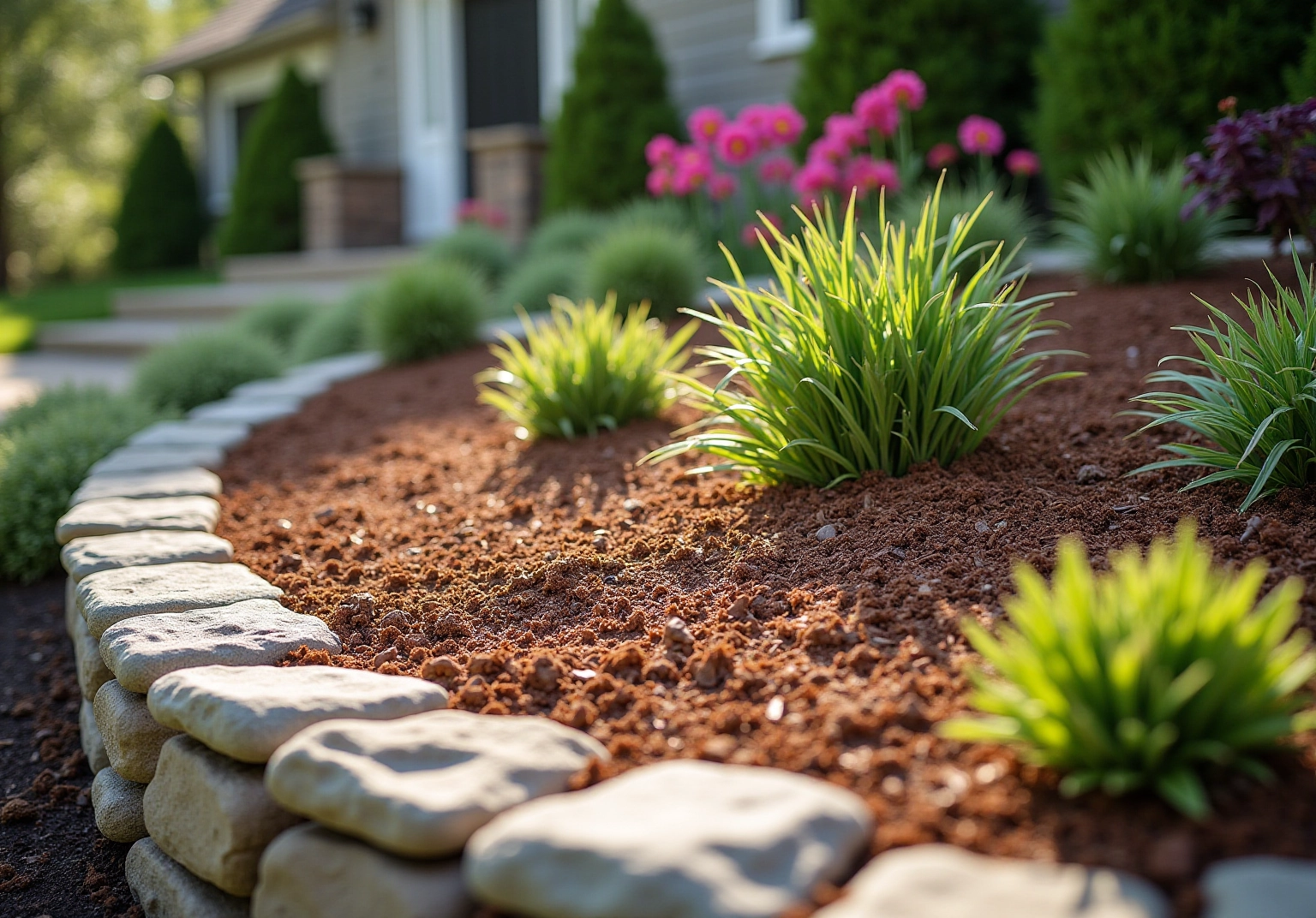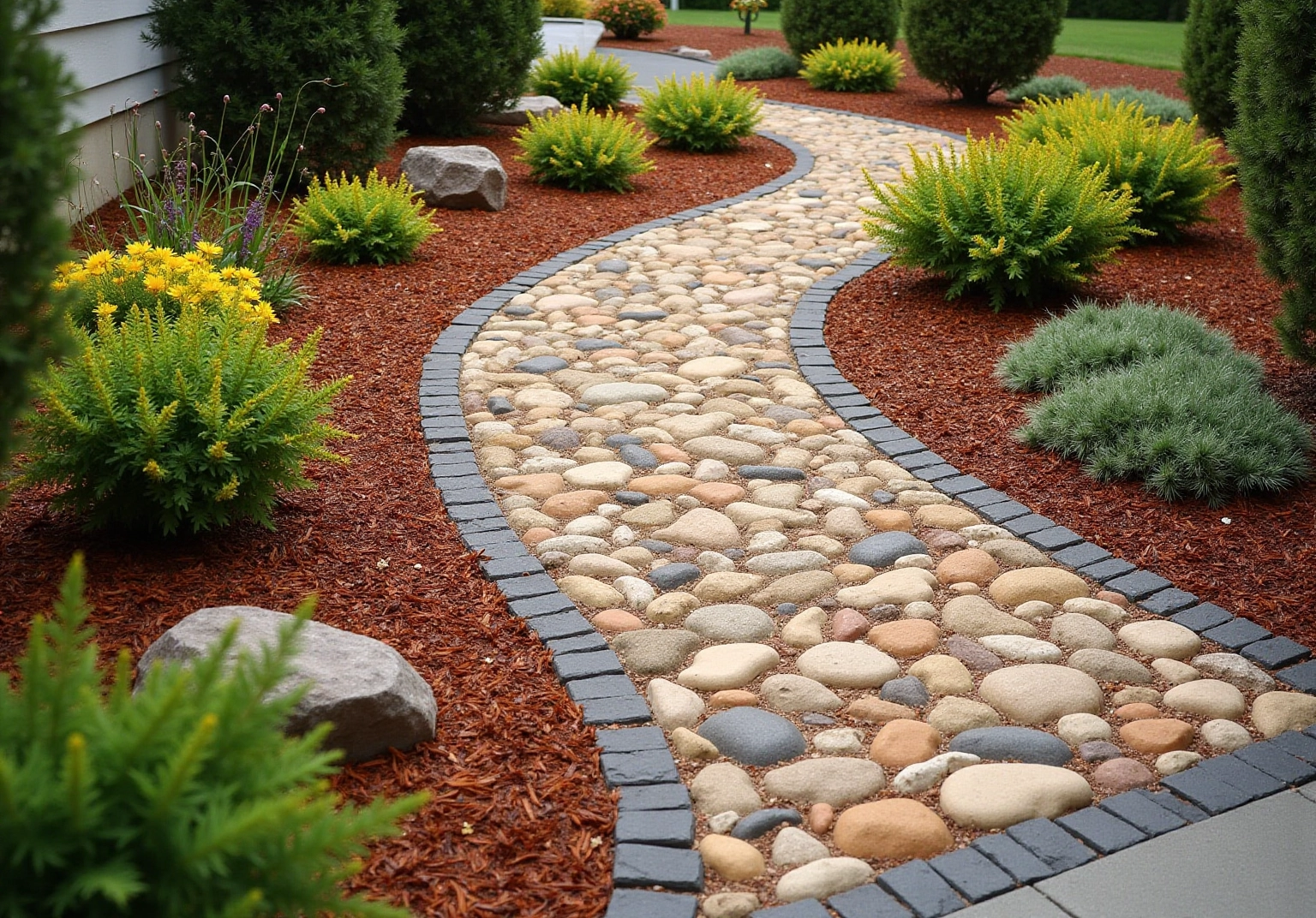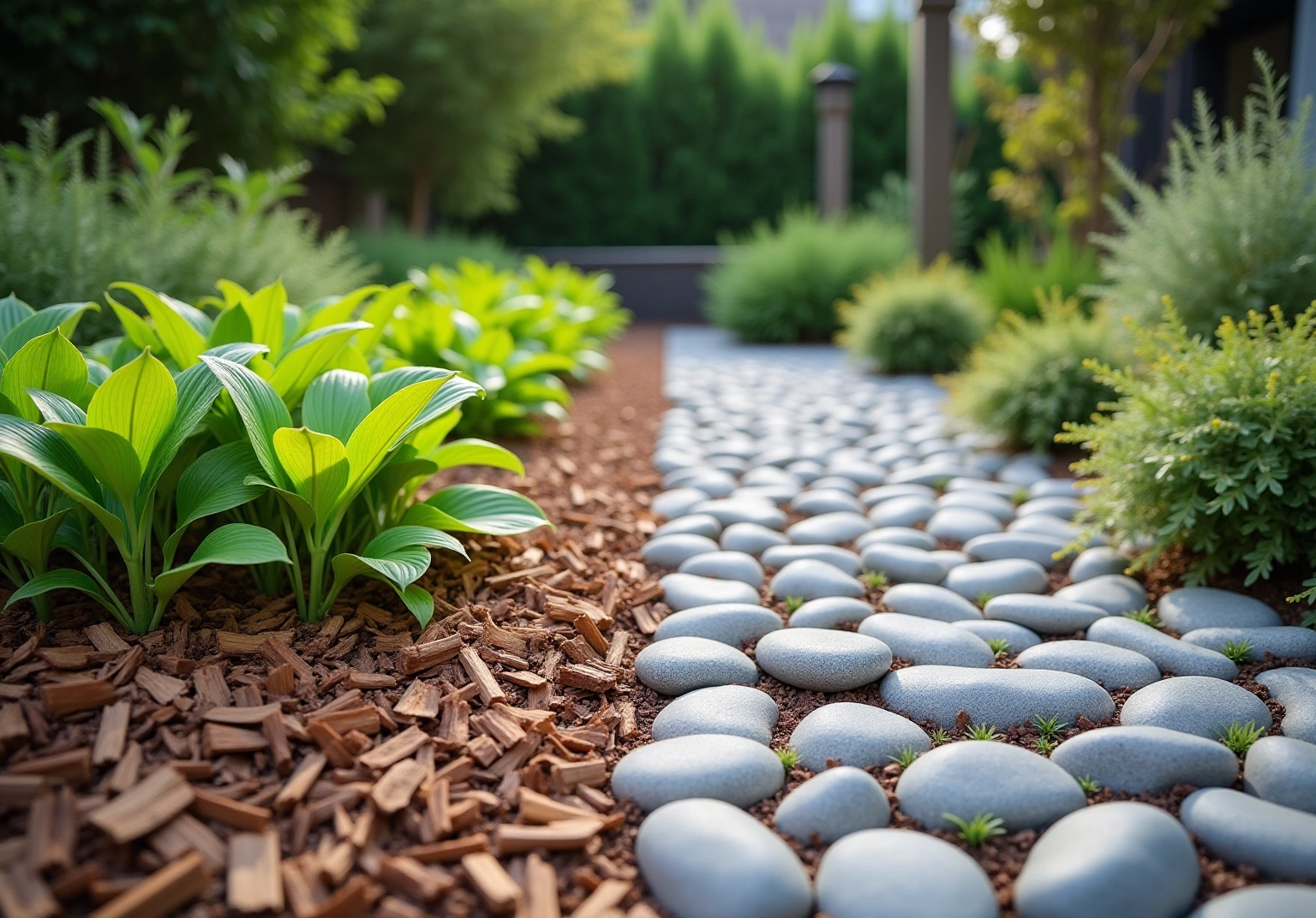Overview
This article provides a comparison of mulch and rocks as landscaping materials, highlighting their respective benefits and drawbacks in luxury landscaping.
It asserts that mulch significantly enhances soil health and moisture retention, making it a valuable choice for plant vitality.
Conversely, rocks are noted for their durability and low maintenance requirements, appealing to homeowners seeking longevity in their landscaping.
Ultimately, the decision hinges on the homeowner’s priorities regarding aesthetics, maintenance, and plant health, underscoring the importance of aligning choices with individual values and needs.
Introduction
Luxury landscaping often depends on the choice of materials that not only enhance aesthetic appeal but also improve functionality. Among the most discussed options are:
- Mulch
- Decorative rocks
Each presents unique advantages tailored to the discerning homeowner’s vision.
- Mulch enriches the soil and promotes plant health.
- Landscape rocks offer a durable, low-maintenance solution.
This raises a pertinent question: which material truly excels in creating the ultimate outdoor oasis? By exploring the distinct pros and cons of each, we can illuminate the best path forward for achieving a stunning and sustainable landscape.
Understanding Mulch and Landscape Rock in Luxury Landscaping
Mulch, typically composed of organic materials such as wood chips, bark, or straw, serves a crucial function in luxury landscaping. It covers the ground to retain moisture, suppress weeds, and promote soil health. As mulch decomposes, it enriches the soil, providing essential nutrients that foster plant growth. This characteristic makes it particularly valuable in upscale gardens where soil vitality is critical. Statistics indicate that mulch significantly contributes to soil health and moisture retention, establishing it as an indispensable component for maintaining vibrant outdoor spaces.
Conversely, decorative stone materials—including gravel, river stones, and ornamental pebbles—primarily enhance aesthetic appeal and durability. Their low-maintenance nature is a notable advantage, as they do not decompose, offering a lasting choice for homeowners who desire enduring beauty in their outdoor areas. Additionally, stones facilitate effective drainage and erosion control, which are vital for preserving the integrity of upscale environments. Notably, landscaping stones help maintain soil stability, preventing topsoil erosion that could adversely affect the environment.
Mulch or rocks can be strategically utilized to create visually appealing and functional outdoor spaces. For instance, landscape stones can outline pathways or edges, while organic materials can enhance garden beds and planting areas. The choice between ground cover and stones often depends on the specific design goals and ecological considerations of the project.
Moreover, ornamental stones do not attract pests and animals, providing a solid surface that is difficult for them to traverse, which is an additional benefit in upscale landscaping. Research shows that using mulch or rocks in landscaping can significantly reduce water runoff, thereby minimizing sedimentation in waterways, while organic materials improve soil health and moisture retention. This dual approach not only elevates the visual appeal of luxury landscapes but also fosters ecological sustainability, aligning with the values of discerning homeowners. Ultimately, integrating both materials can create a harmonious balance of beauty and functionality in outdoor design.

Aesthetic Considerations: Mulch vs. Landscape Rock
In the realm of landscaping aesthetics, ground cover offers a natural, earthy appeal that harmonizes beautifully with diverse plantings and garden styles. Available in a variety of hues and surfaces, this material empowers homeowners to tailor their outdoor areas to reflect their unique vision. Conversely, decorative stones present a structured and refined appearance, ideal for contemporary, minimalist designs.
The choice between mulch or rocks significantly impacts the ambiance of an outdoor space; mulch creates a softer, organic atmosphere, while rocks introduce a contemporary, sophisticated flair. For a luxurious environment, a strategic blend of both mulch or rocks can yield a harmonious and visually striking design, enhancing the overall sophistication of the area.
Impress visitors at every turn by consulting with the expert team at Grow Landscapes, dedicated to helping homeowners make informed decisions that align with their aesthetic and practical needs. Our customized lawn and outdoor maintenance services ensure that your exterior environment not only looks immaculate but also thrives in every season.
As outdoor design trends evolve in 2025, the integration of natural stone and organic materials is increasingly favored, reflecting a commitment to sustainability and personal expression in exterior spaces.

Maintenance and Durability: Evaluating Long-Term Value
Mulch or rocks typically require replenishment every one to two years due to the organic nature of mulch, which leads to decomposition and a decline in effectiveness. This ongoing maintenance can be a significant consideration for homeowners who prioritize low-maintenance landscaping solutions. Notably, ground cover can reduce irrigation water usage by approximately 20-25%, making it a viable option for those concerned about water conservation.
In contrast, decorative stone showcases exceptional durability, often enduring for decades without the need for replacement. While it may require occasional cleaning to remove debris and maintain its aesthetic appeal, the overall maintenance demands are minimal compared to those of mulch or rocks. Furthermore, decorative stone necessitates ground fabric beneath it for long-term weed management, which is a significant factor for upkeep.
For homeowners seeking a long-term investment that reduces maintenance, mulch or rocks present an appealing choice, despite their higher upfront cost. This durability not only enhances the visual appeal of luxury landscapes but also contributes to increased property values, making it a wise choice for discerning homeowners.
However, potential drawbacks of ground cover include its tendency to attract pests and the risk of mold in humid conditions, which are important factors to consider when making landscaping decisions.
Pros and Cons: Weighing Mulch Against Landscape Rock
When assessing landscaping materials, wood chips present several compelling advantages, particularly in luxury settings. They enhance soil health by improving moisture retention and providing essential nutrients as they decompose, fostering a vibrant environment for plant growth. In fact, organic material can nearly double the growth rate of trees and plants, making it a favored choice among homeowners looking to elevate their outdoor spaces. Furthermore, organic covering offers a natural aesthetic that complements various garden styles.
However, this ground cover has its drawbacks. Regular replacement is necessary to maintain its appearance and effectiveness, which can lead to ongoing maintenance costs. Additionally, as organic matter breaks down, it may attract pests, potentially impacting the overall health of the garden. It’s also important to note that organic mulch requires periodic reapplication, adding to the maintenance considerations.
In contrast, decorative stones are valued for their durability and minimal upkeep needs. They provide a modern aesthetic that aligns well with contemporary landscaping trends, making them an attractive option for luxury homeowners. Landscape stones are also effective in preventing ground erosion and weed proliferation, contributing to a tidy appearance.
Yet, landscape stone has its disadvantages. Unlike ground cover, it does not enrich the soil with nutrients, which can hinder plant health over time. Furthermore, stones can retain heat, potentially creating an unsuitable habitat for certain plants that thrive in cooler climates. Inorganic ground cover can lead to overheating, an important factor to consider when selecting plants.
Ultimately, the choice between mulch and decorative rock hinges on the homeowner’s priorities—whether they value aesthetics, ease of maintenance, or plant health. Engaging with a landscape architect can provide valuable insights tailored to specific garden goals, ensuring that the chosen material aligns with the desired outdoor experience.

Conclusion
Choosing between mulch and decorative rocks is a pivotal decision in luxury landscaping, as each material brings its own set of benefits and challenges. Mulch excels in enriching soil health and promoting plant vitality, making it an essential choice for those looking to cultivate lush gardens. Conversely, landscape rocks offer a durable, low-maintenance alternative that enhances aesthetic appeal while ensuring long-lasting beauty.
Key points throughout the article highlight the unique advantages of each option:
- Mulch’s ability to retain moisture and improve soil quality
- The enduring nature of decorative stones, which require minimal upkeep
- Decorative rocks provide effective drainage solutions
A thoughtful combination of both materials can create a visually striking and functional outdoor environment tailored to individual preferences.
Ultimately, the decision between mulch and rocks should align with the homeowner’s specific landscape goals, whether enhancing plant health, minimizing maintenance, or achieving a particular aesthetic. Engaging with landscaping professionals can provide tailored insights that elevate the outdoor space, ensuring it not only meets practical needs but also reflects personal style and a commitment to sustainability.
Frequently Asked Questions
What is mulch and what are its functions in luxury landscaping?
Mulch is typically composed of organic materials such as wood chips, bark, or straw. Its main functions include retaining moisture, suppressing weeds, and promoting soil health. As it decomposes, it enriches the soil with essential nutrients that foster plant growth.
Why is mulch important for upscale gardens?
Mulch is important for upscale gardens because it significantly contributes to soil health and moisture retention, which are critical for maintaining vibrant outdoor spaces.
What are the advantages of using decorative stone materials in landscaping?
Decorative stone materials, such as gravel, river stones, and ornamental pebbles, enhance aesthetic appeal and durability. They are low-maintenance, do not decompose, facilitate effective drainage, and help with erosion control.
How do mulch and landscape rocks differ in their application?
Mulch is often used to enhance garden beds and planting areas, while landscape rocks can outline pathways or edges. The choice between the two depends on specific design goals and ecological considerations.
What ecological benefits do mulch and rocks provide in landscaping?
Using mulch improves soil health and moisture retention, while rocks help reduce water runoff and sedimentation in waterways. Both materials contribute to ecological sustainability in luxury landscaping.
Do ornamental stones attract pests or animals?
No, ornamental stones do not attract pests and animals, providing a solid surface that is difficult for them to traverse, which is beneficial for upscale landscaping.
Can mulch and rocks be used together in landscaping?
Yes, integrating both materials can create a harmonious balance of beauty and functionality in outdoor design, enhancing both the visual appeal and ecological sustainability of the landscape.



